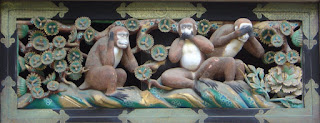
At the main entrance of an ancient shrine in Nikkō, Japan there are statues of the three wise monkeys named Mizaru, Kikazaru and Iwazaru. For centuries, they have been sending a special message to the world;
• Mizaru is covering his eyes with his hands indicating “see no evil”
• Kikazaru is covering his ears indicating “hear no evil”
• Iwazaru is covering his mouth indicating “speak no evil”
This centuries’ old pictorial maxim with its profound message of “see no evil, hear no evil, speak no evil” has helped countless people avoid the traps of evil.
So how is this ancient message relevant to us today? It is more relevant that ever before. Here are some examples;
• Media with its army of talk show hosts, experts and reporters who are hell bend on finding anything and everything that they perceive to be wrong and evil and constantly bombarding their viewers with it.
• Politicians and civic leaders whose sole focus is to point out the “evil” and holding the other party responsible for it.
• Managers and consultants who specialize in being “problem solvers” and “trouble shooters” can only see problems. Even when they can’t find a real problem, they create one, so they can solve it.
• Parents who only pay attention to their children when they are doing something wrong – they never “catch” their kids doing something right.
• People who will instantly notice “evil” in others but will never see, hear and talk about what is good.
• People wanting to “vent” about people in their lives they perceive as bad, not really realizing that their venting is only intensifying not only their own misery but also making other people miserable.
Life is like Google. If you search for “life sucks” on Google, you are going to find millions of matches and if you really start reading them you will have no trouble justifying why your life really sucks. But if you search for “life is great”, you are sure to fund countless matches and reasons for that too. Like Google, universe just returns to you what you are searching for - if you are searching for misery, gloom, and evil, you are certainly going to find plenty of it, but if your search is for joy, bliss and good, that’s exactly you, are likely to find.
You not only change yourself by looking at the world positively, you actually can change the world that you look at. As Dr Wayne Dyer – a leader in field of positive psychology – once said “When you change the way you look at things – the things you look at change!” Life is not what happens to us, life is how we respond to what happens to us. And your response determines the life that you create for yourself. Don’t limit yourself by old habitual ways of seeing, hearing and speaking evil. Learn to see, hear and speak “good” – the positive.
Describing the qualities of the righteous people, this is how Quran addresses this issue;
“… When the ignorant talk to them, they say, "Goodbye!"
Simply say “peace”, “goodbye” or “take care” and walk away, you don’t have to hear or react to every ignorant in the world out there. Don’t feel compelled to understand and “fix” every evil in the world. You will simply become one in the process. Focus on good and good is what will be returned to you.
In many modern management philosophies emphasis has been on “trouble shooting” or “problem solving”. Coupled with training on how to solve problems, consultants and managers see people, projects and organization as problems to be solved. There is no shortage of managers who take great pride in being “trouble shooters” or “problem solvers”. But there is a big problem with this approach. If you see your role as being a “trouble shooter” or “problem solver”, to you, everything is going to look like trouble or problem to be solved. As the maxim goes; if all you have hammer, everything looks like a nail. But there is hope. In the world of management consulting there is a new philosophy called “Appreciative Inquiry” or AI. AI puts a modern spin to the age old truth of “see no evil, hear no evil, and speak no evil” by focusing on (and appreciating) what works as opposed to what does not work. AI focuses on strengths, successes, and dreams, to bring positive change to human systems and organizations.
Breaking lifelong habits is not easy, but being mindful of what you see, hear and speak is certainly a first step towards it. I recently learned “rubber-band therapy” trick of mindfulness from a friend that you might useful. Find a nice sturdy rubber band – any color would do it but go for the red color if you could find one. Put it around your wrist. Anytime you find yourself hearing, seeing or speaking “evil”, pull the rubber band with the other hand then let it go…I know, I know it’s going to hurt. But trust me hurt caused by the rubber band is lot less than the hurt caused by you going down the path of “evil”. So go ahead, try this rubber-band therapy, this might be the help you need to break you age-old pattern of negative behavior.
Here is a very fascinating story that I came across recently:
"One day I hopped in a taxi and we took off for the airport. We were driving in the right lane when suddenly a black car jumped out of a parking space right in front of us. My taxi driver slammed on his brakes, skidded, and missed the other car by just inches! The driver of the other car whipped his head around and started yelling at us. My taxi driver just smiled and waved at the guy. And, I mean, he was really friendly. So I asked, 'Why did you just do that? This guy almost ruined your car and sent us to the hospital!' This is when my taxi driver taught me what I now call, 'The Law of the Garbage Truck.' He explained that many people are like garbage trucks. They run around full of garbage, full of frustration, full of anger, and full of disappointment. As their garbage piles up, they need a place to dump it and sometimes they'll dump it on you. Don't take it personally. Just smile, wave, wish them well, and move on. Don't take their garbage and spread it to other people at work, at home, or on the streets.”
If evil is what you see, hear and speak; evil is what you are likely to become, and if good is what you see, hear and speak, good is what you become…that’s just the way it works. So choose to see the good side of the world around you, walk away from people trying to dump their garbage on you and think before you speak…if you can’t speak with kindness and love, it’s probably better to stay quiet.
All this is very simple and easy. But for some, an easy message can’t be of any value. They are used to things so complicated that they need intermediaries just to understand them, forget about being able to practice them. Things are made complicated by those who want to control you by being interdediaries. Easy is right, and right is easy. if it’s not easy, it probably not right.
So if you want to live on the good side of life, stop seeing, hearing and speaking eveil. Life is good. Live it.




